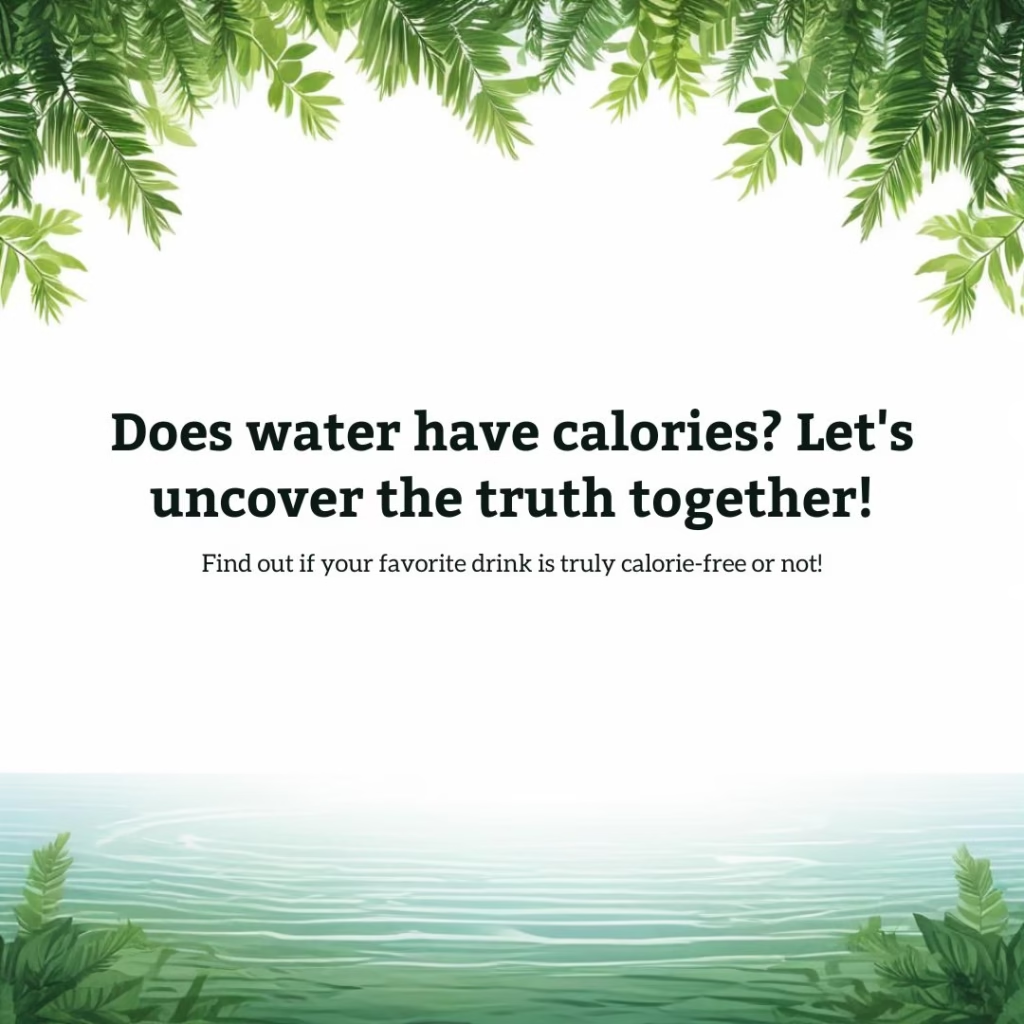Water is vital for sustaining life, but many people often ask: does water contain calories? Grasping the calorie content of water and its effects on health can empower you to make more informed nutritional choices. This guide delves into the science of water and its relationship to calories, exploring how various types of water differ in their nutritional profiles. By understanding these distinctions, you can better appreciate the role of water in your diet and overall well-being, helping you to choose the best hydration options for your lifestyle.
Understanding Calories
Every time you sit down to enjoy a meal, each food item and beverage contains energy stored in chemical bonds. Once you ingest food or drink, your body metabolizes it, breaking it down to release this stored energy. Your cells capture and utilize this energy to support essential bodily functions necessary for survival. To quantify the energy extracted from food and drinks, we use the unit known as a calorie. In essence, a calorie serves as a standard measurement for energy.
The Science Behind Energy Measurement
Here’s an interesting scientific detail: the term “calorie” is technically defined as the amount of energy required to raise the temperature of 1 gram of water by 1 degree Celsius, according to the National Library of Medicine. However, when we refer to the energy content in food and beverages, we are actually talking about kilocalories (kcal), which equal 1,000 calories. Using kilocalories is more practical for measuring food energy because of the significant amount of energy contained in food molecules. For example, it’s simpler to say that a medium banana contains 105 kcal rather than 105,000 cal. In everyday language, we often use “calories” to mean “kilocalories,” so we say that a banana has 105 calories.
Almost everything we consume has a calorie count, and those calories derive from three primary energy sources: carbohydrates, proteins, and fats.
Macronutrients and Calories
- Carbohydrates: 4 calories per gram
- Proteins: 4 calories per gram
- Fats: 9 calories per gram
Since water does not contain any of these macronutrients, it has no calories.
Carbohydrates
Carbohydrates, one of the three macronutrients that provide energy, often receive negative attention. However, when consumed, they break down into glucose, which serves as the primary fuel for your brain, red blood cells, and nervous system. Carbohydrates are categorized as simple or complex based on their sugar molecule structure. Simple carbs, found in table sugar and fruit juice, are quickly digested but can cause rapid spikes in blood sugar. Whole fruits contain simple carbs too, but their high fiber content slows sugar absorption. In contrast, complex carbs in unrefined whole grains, legumes, and vegetables digest more slowly, offering sustained energy. Each gram of carbohydrate provides 4 kcal of energy.
Protein
While the body can use protein for energy, it primarily relies on this macronutrient to repair tissues, synthesize antibodies, create enzymes, produce hormones, balance pH, and transport nutrients. As a result, protein is seldom used as an energy source. To preserve protein for these critical functions, the body first uses carbohydrates and fats as fuel. Therefore, consuming enough carbohydrates and fats is essential to prevent protein from being converted into energy (Singh et al., 2017). However, if calorie intake from carbs and fats is insufficient, the body may break down protein for 4 kcal per gram. Protein-rich foods include meat, eggs, dairy, legumes, nuts, and seeds.
Fats
Dietary fats are essential for protecting vital organs, insulating the body, producing hormones, and aiding the absorption of vitamins A, D, E, and K (McDonald & Eskin, 2007). They can also serve as an energy source. While carbohydrates are the body’s preferred fuel, fats are more densely packed and store more energy in less space, making them the primary long-term energy storage molecules. When excess calories are consumed, they are stored in adipose (fat) tissue. One gram of dietary fat provides 9 kcal of energy, making it the most energy-dense macronutrient. This higher energy content is particularly useful during prolonged low-to-moderate activities, like brisk walking or cycling. Foods rich in healthy fats include butter, eggs, fatty fish, avocados, oils, nuts, and seeds.
The Composition of Water
Chemical Structure
Water, scientifically represented as H₂O, consists of two hydrogen atoms bonded to one oxygen atom. This simple yet essential molecule lacks carbohydrates, proteins, and fats, which are the primary sources of calories in our diet. As a result, water itself does not provide any caloric energy, making it a unique and vital component of nutrition.
Physical Properties
Pure water is characterized by its odorless and tasteless nature, and it is completely calorie-free. This makes it an ideal choice for hydration without adding any extra calories to your diet. However, it’s important to note that flavored or mineral-enhanced waters may contain added ingredients that can contribute to their calorie content. These variations can include sugars, sweeteners, or minerals, which can affect both the flavor and the nutritional profile of the water. Always check labels if you’re mindful of your calorie intake while enjoying these products.
Does Water Have Calories?
The Simple Answer: “No”
Pure water contains zero calories because it lacks macronutrients. Unlike foods and beverages that provide energy through carbohydrates, fats, or proteins, water’s role in the body is solely focused on hydration and supporting essential metabolic processes without contributing any energy.
Why No Calories?
Water does not supply energy in the way that food does. Foods and drinks that contain sugar, fat, or protein can be metabolized to release calories, which the body uses for energy. In contrast, water serves a different purpose.
It plays a crucial role in various physiological functions, including:
- Temperature Regulation: Water helps maintain the body’s core temperature through processes like sweating and respiration. When the body heats up, sweat evaporates from the skin, cooling the body down.
- Nutrient Transport: Water is a key component of blood, which transports nutrients, oxygen, and hormones to cells throughout the body. It also aids in removing waste products from cells, ensuring efficient metabolic function.
- Digestion: Water assists in the digestion and absorption of nutrients. It helps dissolve vitamins, minerals, and other nutrients, making them more accessible for absorption in the intestines.
- Joint Lubrication: Water acts as a lubricant for joints, helping to reduce friction and allowing for smoother movement.
Types of Water and Their Caloric Content
Pure Water
Characteristics: Pure water is simply H₂O, devoid of any additives or flavors. It is the most basic form of hydration.
Caloric Content: Pure water contains zero calories, making it an excellent choice for those looking to stay hydrated without impacting their calorie intake.
Uses: It is ideal for quenching thirst and maintaining hydration during daily activities or exercise, ensuring that you can stay refreshed without consuming any calories.
Flavored Water
Overview: Flavored water is water that has been infused with fruits, herbs, or artificial flavors, adding a hint of taste without the need for sugary drinks.
Caloric Content:
- Naturally Flavored Water: Typically contains zero calories, especially if it is infused with fruits or herbs without added sugars.
- Artificially Flavored Water: May include added sugars or sweeteners, which can increase its calorie content. These additions often enhance flavor but can also lead to unexpected calorie intake.
Tip: Always check product labels for added ingredients to ensure you know what you’re consuming and to avoid added sugars that could contribute to your overall calorie count.
Mineral Water
Definition: Mineral water is water that contains naturally occurring minerals like calcium, magnesium, and potassium, which can either be naturally present or added during the bottling process.
Caloric Content: Generally, mineral water has zero calories unless sugars or flavors are included. This makes it a healthy choice for hydration.
Benefits: In addition to hydration, mineral water can provide essential nutrients that support bone health and muscle function, all without adding calories to your diet.
Sports and Electrolyte Drinks
Purpose: Sports and electrolyte drinks are specifically designed to rehydrate and replenish electrolytes lost during exercise or intense physical activity. They often contain a mix of water, sugars, and electrolytes like sodium and potassium.
Caloric Content: The calorie content of these drinks varies widely, typically ranging from 50 to 200 calories per bottle, depending on the sugar content and ingredients used.
Comparison: While plain water is calorie-free, sports drinks can add significant calories, especially if they contain high levels of sugar. It’s important to consider your hydration needs and energy expenditure when choosing between plain water and sports drinks, particularly if you’re engaged in prolonged physical activity.
The Role of Water in Weight Management
Hydration and Health
Overall Importance: Water is essential for maintaining proper hydration, which is vital for overall health and well-being. Adequate hydration supports various bodily functions, including circulation, temperature regulation, and nutrient transportation. Staying hydrated can enhance energy levels, improve cognitive function, and promote physical performance, making it a cornerstone of a healthy lifestyle.
Appetite Control
Role in Weight Management: Drinking water before meals can effectively help control appetite. By consuming water prior to eating, you may feel fuller, which can lead to reduced hunger and a decreased likelihood of overeating. This strategy can be particularly beneficial for those looking to manage their weight, as it can help you consume fewer calories overall without feeling deprived.
Metabolic Processes
Impact on Metabolism: Water is crucial for various metabolic processes within the body. It enhances the efficiency of calorie burning by facilitating the breakdown of nutrients during digestion and absorption. Proper hydration supports the body’s ability to metabolize carbohydrates, proteins, and fats effectively. Additionally, water aids in the elimination of waste products, ensuring that metabolic functions continue to operate smoothly. This makes hydration an important factor in maintaining a healthy metabolism and optimizing energy levels throughout the day.
Common Myths About Water and Calories
- Myth: All Water Contains Calories
- Fact: Pure water has zero calories because it contains no macronutrients like carbohydrates, fats, or proteins. Flavored waters can have calories if manufacturers add sweeteners or sugars, but plain water stays calorie-free.
- Myth: Drinking Water Can Replace Meals
- Fact: While drinking water can help control appetite and reduce the urge to overeat, it cannot replace the nutritional value of meals. Water does not provide essential nutrients that the body needs for overall health.
- Myth: Sparkling Water Has Calories
- Fact: Unsweetened sparkling water is also calorie-free. The carbonation does not add calories, but be cautious of flavored sparkling waters that may contain added sugars.
- Myth: Drinking Cold Water Burns More Calories
- Fact: While drinking cold water may slightly increase calorie expenditure as the body works to warm it up, the effect is minimal and not significant enough to impact weight loss.
- Myth: You Don’t Need to Drink Water if You Eat Foods with High Water Content
- Fact: While fruits and vegetables can contribute to hydration, they typically don’t provide enough water on their own. It’s still essential to drink water regularly to ensure adequate hydration.
Conclusion
In conclusion, water is essential for life, playing a vital role in hydration, metabolic processes, and overall health. Many people ask, “Does water have calories?” The answer is simple: pure water has zero calories, making it ideal for hydration without affecting caloric intake.
While flavored and mineral waters may contain added calories from sugars or other ingredients, plain water remains calorie-free. Additionally, drinking water can help control appetite and enhance metabolic efficiency, supporting weight management and boosting energy levels.
By debunking common myths about water and its caloric content, you can better understand its importance in a balanced diet. Whether opting for pure water, flavored options, or mineral varieties, prioritizing hydration is crucial for optimizing health. Ultimately, incorporating sufficient water intake into your daily routine is an effective way to support your body’s functions and maintain a healthy lifestyle.
FAQs
- Does water have calories?
No, pure water has zero calories. - Does flavored water have calories?
Some flavored waters with added sugars or sweeteners may contain calories. - Why doesn’t water have calories?
Water has no macronutrients like carbohydrates, proteins, or fats that provide calories. - Can water help you lose weight?
Yes, water can support weight loss by reducing appetite and boosting metabolism. - Does mineral water have calories?
Most mineral water contains no calories unless manufacturers add extra ingredients. - What about sparkling water—does it have calories?
Pure sparkling water is calorie-free, but flavored versions may contain calories. - Do sports drinks have more calories than water?
Yes, sports drinks often contain sugar, which adds calories. - Does drinking water speed up metabolism?
Drinking water can temporarily boost metabolism, aiding in calorie burn. - How can I check if water has calories?
Read the label for added ingredients like sugars or sweeteners. - Is water the healthiest beverage?
Yes, water is calorie-free, hydrating, and essential for overall health.
If you like post, you may also like
Thanks for reading, for more interesting articles, please visit our homepage.








Pingback: Tachi: A Cultural Symbol of Japan’s Samurai Legacy - MrAH with A Bee